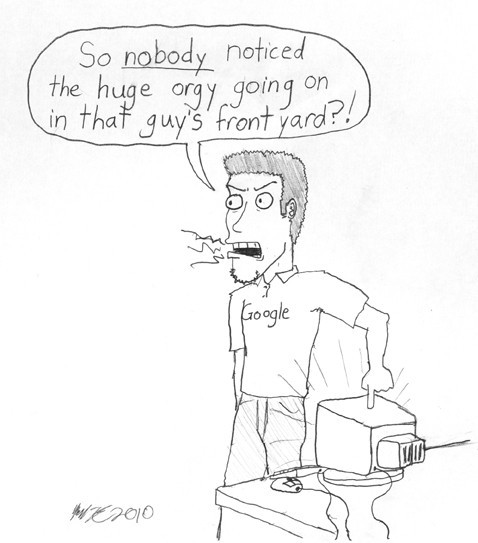The Tamagotchi of technologies?
The controversy over Google Street View continues
Early last year Google came to town, driving up and down the streets of Winnipeg photographing neighbourhoods from one corner of the city to another.
The results – despite leaving something of an uproar over privacy issues in their wake – is a nifty yet somewhat feckless search engine of sorts which allows you to view nearly any location in the city.
Responses to the technology range from outrage, to intrigue, to outright boredom.
“It’s like Facebook for people who have just bought houses,” posited 30-year-old Calgary native Darcy Fieber. “It seems like a way for people to feed their own egos by showing off their houses to friends who live far away.”
Indeed, it seems that the oft-searched location for first-time users isn’t some far off locale whose aesthetic is unknown but rather, one’s own residence.
This search sometimes gleans unappealing results.
“The Google people came and took a really creepy picture of my home. There’s a garbage bag in front of it. It’s upsetting,” revealed 23-year-old Hollie Pitcher.
Many were in fact concerned that Google capturing our fair city during the winter months was like having a seminal photograph taken of oneself without makeup, or with some sort of obvious complexion defect.
Posters on Metafilter.com felt that to present Winnipeg to the world in such a state of January-induced duress was not putting our “best face forward” to the rest of the world.
There is an amusing defect at 620 Niakwa Road – the Niakwa Country club – wherein one side of the street is immersed in winter and the other in summer.
If nothing else, Winnipeggers seem to feel that Street View acts as a kind of historical document – a sort of virtual proof of ones own existence.
“I was disappointed my car did not come up anywhere. It makes me feel like I’m here but yet I’m not,” explained 23-year-old car enthusiast Sheryl Bonkoski.
“ It seems like a way for people to feed their own egos by showing off their houses to friends who live far away.
Darcy Fieber
There are those who would be delighted at appearing on Street View and then those who find the entire concept horrifying.
Though there is a “report a problem” link, with faces also blurred using the latest techniques, many are still adamantly against the use of it in any capacity.
“I do not agree with it at all. I feel it is against the law and an invasion of my privacy. Google should not be allowed to photograph people. Written consent should be required,” insisted Mike Lord, 21.
Some Winnipeggers also felt that the criminal element would begin to use the technology to their advantage.
“I have some questions regarding privacy issues where this technology is concerned. I’m sure Google has consulted with their lawyers and I’m sure they aren’t doing anything illegal. However, that doesn’t mean that it doesn’t raise concerns,” explained Randy Kobes, associate dean of science at the University of Winnipeg.
Suggested uses of Street View include scouting properties for potential home buyers, checking out vacation spots and looking up those exotic ports of call that have always eluded you.
If these applications sound limited to you, you are not alone in your assessment.
When asked what the practical uses of this technology might be, Kobes was at something of a loss and compared Street View to the hula hoop – fun for a time but potentially a fad. A glorified Tamagotchi, if you will.
Unless of course, great minds can find ways to put the technology to more practical, less dispensable use.
“At this point I think it is still somewhat of a novelty and a curiosity. It’s possible that the full potential of this technology has yet to be realized,” said Kobes.







